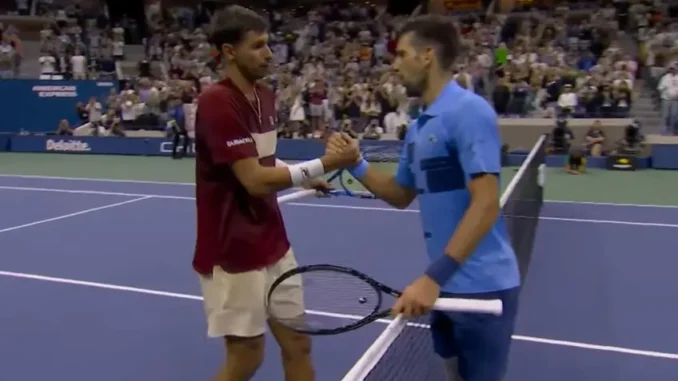
Alexei Popyrin’s victory over Novak Djokovic at the US Open has become one of the most talked-about moments in recent tennis history. The Australian’s ability to upset one of the greatest players of all time was no small feat, and Popyrin has since revealed the strategy that led to his stunning triumph. In a post-match interview, Popyrin explained how he managed to execute a game plan that not only unsettled Djokovic but ultimately handed the 23-time Grand Slam champion a rare defeat.
The match was billed as a David-versus-Goliath contest. Djokovic, a perennial favorite and a master of the big stage, entered the tournament with high expectations, aiming to extend his Grand Slam tally. On the other side of the net was Popyrin, a talented but relatively unheralded player who was determined to make his mark. What unfolded was a thrilling encounter that showcased not just Popyrin’s skill but also his mental fortitude and tactical intelligence.
From the outset, Popyrin knew he would need to play a near-perfect match to have any chance against Djokovic. “You have to take Novak out of his comfort zone,” he said after the match. “He never likes it when you dictate the pace, and that’s what I tried to do.” The Australian’s approach was clear: to prevent Djokovic from settling into his rhythm and to force the Serbian star to adapt to a game that wasn’t on his terms.
One of the keys to Popyrin’s success was his aggressive serving. Known for his powerful first serve, Popyrin used it to great effect, consistently putting Djokovic on the defensive. By mixing up his serve placement and speed, he kept Djokovic guessing, preventing him from taking control of points early. Popyrin also backed up his serve with well-timed net approaches, cutting down Djokovic’s ability to extend rallies and impose his baseline dominance.
Popyrin’s forehand was another weapon that played a crucial role in the upset. The Australian unleashed a barrage of heavy, deep forehands, often targeting Djokovic’s backhand to create openings. His ability to dictate with his forehand allowed him to seize control of baseline exchanges, an area where Djokovic typically thrives. Popyrin also displayed exceptional shot placement, frequently hitting down the lines and into the corners to keep Djokovic on the move.
Perhaps the most impressive aspect of Popyrin’s performance was his mental resilience. Djokovic, known for his ability to grind down opponents mentally and physically, tested Popyrin’s resolve throughout the match. There were moments when it seemed the Serbian star might wrestle back momentum, particularly during the tight second set. However, Popyrin held firm, refusing to let the occasion overwhelm him. His composure under pressure, particularly in high-stakes points, was a testament to his growth as a player.
One of the strategies Popyrin employed was to avoid playing into Djokovic’s strengths. “He’s so good at turning defense into offense,” Popyrin said. “I knew I couldn’t let him dictate the rallies.” To counter this, Popyrin varied his shots, employing drop shots, slices, and occasional lobs to disrupt Djokovic’s rhythm. These tactical adjustments forced Djokovic to play a less familiar style of tennis, reducing his ability to dominate from the baseline.
Popyrin also credited his team for helping him prepare for the match. “We studied his matches, looked for patterns, and came up with a plan that we believed could work,” he explained. “It wasn’t just about hitting big shots but knowing when to take risks and when to stay patient.” This meticulous preparation paid off as Popyrin executed the plan with precision, showcasing not just his physical abilities but also his strategic acumen.
Djokovic, for his part, acknowledged Popyrin’s brilliance on the day. While visibly frustrated during parts of the match, the Serbian was gracious in defeat, admitting that Popyrin’s aggressive tactics had caught him off guard. “He played with a lot of courage,” Djokovic said afterward. “He deserved the win today.”
The victory marked a significant milestone for Popyrin, who has long been touted as a rising star. Born in Sydney to Russian parents, the 24-year-old has steadily climbed the rankings, earning a reputation for his powerful game and fighting spirit. However, defeating a player of Djokovic’s caliber on one of tennis’s biggest stages was a breakthrough moment that could define his career.
Popyrin’s win also highlighted the increasing competitiveness of men’s tennis. As the sport transitions from the era dominated by the Big Three—Federer, Nadal, and Djokovic—new faces are stepping up to challenge the established order. Popyrin’s triumph serves as a reminder that the next generation is ready to make its mark, bringing fresh energy and excitement to the tour.
For Djokovic, the loss was a rare setback in an otherwise stellar career. While disappointing, it is unlikely to derail his quest for further greatness. The Serbian has proven time and again that he can bounce back from adversity, using defeats as motivation to improve and return stronger. However, Popyrin’s victory may serve as a blueprint for other players looking to challenge Djokovic in the future.
As the tennis world reflects on this remarkable upset, Popyrin’s achievement resonates as a story of preparation, execution, and belief. His ability to topple a legend like Djokovic speaks volumes about his potential and his determination to succeed at the highest level. For fans, the match was a thrilling spectacle that encapsulated the drama and unpredictability that make tennis so compelling.
Looking ahead, Popyrin will aim to build on this success, using the confidence gained from defeating Djokovic as a springboard for greater accomplishments. As for Djokovic, the loss will likely serve as a reminder that even the greatest players are not invincible—a challenge he will undoubtedly rise to meet in his pursuit of further glory.
Leave a Reply